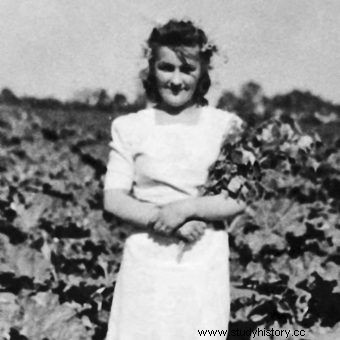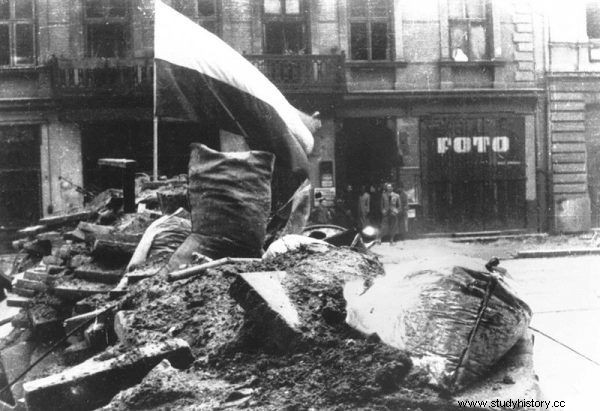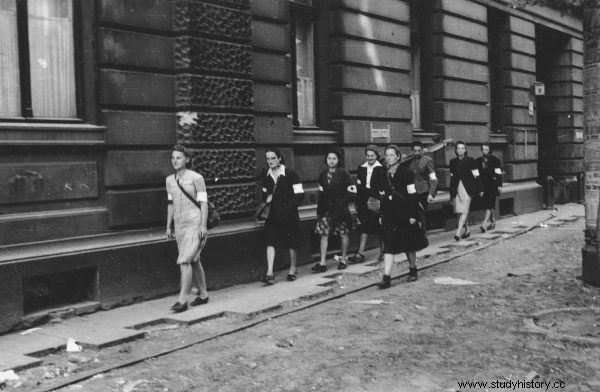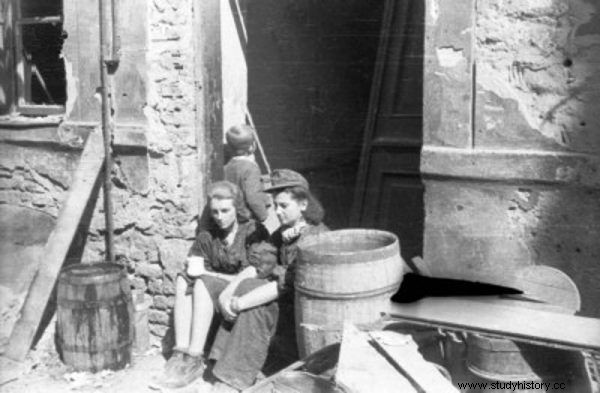In 1944 "Hanka" was in the second grade of junior high school. Despite her young age, she joined a sanitary facility in Mokotów. Years later, she talks about her experiences and confesses when she felt fear for the first time. How did she deal with the nightmare of war?
[Tells Hanna Stadnik, pseudonym "Hanka":]
I perfectly remember the "W" hour. My sister and I - after saying goodbye to our parents - leave the gate and three boys are to follow us. We have sanitary bags on the shoulder, but no distinctive signs so that we cannot be recognized as insurgents.

Hanna spent the uprising as a nurse in Mokotów. Photo from the book "Insurgents".
We go and suddenly these boys start humming, "Hey boys, bayonet guns!" Then we reply to them too: "Hey boys, a gun bayonet!" . And so we got to Marszałkowska Street. They went to Żoliborz and we went to Mokotów. I never saw them again, but it was extremely touching (…).
First wounded
I remember that on August 1st I was wearing only knee socks, a navy blue skirt and some thin blue blouse. And all this has not been washed for two months! I do not know how it's possible! For years, after the Uprising, my colleagues and I wondered how it was that we survived so long in one garment . In one underwear! Even longer than two months, because after the Uprising I was in the camp. Later the boys got some military clothes and decent shoes, but we were too small, too small, to be good for us. We couldn't wear them. Fortunately, the weather was beautiful throughout the Uprising (…).
There was great euphoria on the first day. I don't know where it came from, but you could see white and red flags in the houses right away. We immediately got white and red armbands. You could see the Poland we loved and which we knew from our childhood years. To see the white and red flag after so many years of captivity was a great joy and a great emotion (...).

To see white and red flags after many years was a great emotion - recalls Hanna.
There were several new wounded every day. The fights lasted all the time, from morning to night. When we managed to bring someone back to the hospital, more appeared. We gave all the water we had to them. That they would have something to drink, wash their wounds, change the dressing. It was a very active life, during those less than two months. It was calmer for the first two weeks, but then it got worse. We were beginning to understand that this was a lost cause.
It was a great experience for me to see the first wounded man. Suddenly a lot of blood everywhere! He was shot, but luckily it turned out that the bullet went right through and did not damage much. A pressure bandage was enough and the boy continued to fight. This was the first moment that fear appeared.
On the second day of the Uprising, a wounded German came to us. The dilemma - what should we do ?! After all, this is our enemy! Nevertheless, we decided to take care of him, because how can we not help if he needed help? During the courses they taught us that the wounded is the wounded. Everyone needs help. We took him to a sanitary point and treated him. He was in such a state that he could not walk. He had to stay with us. We didn't understand what he was saying, but we fed him.
Two days later, a brigade led by Bronisław Kaminski suddenly burst into the apartment where we were. They were Russians with Mongolian faces. We've heard of their cruelty before. They raped and murdered in horrific ways. They wanted to shoot us all and he saved us! He summoned his commander, a German officer, who chased them away. It was a form of transaction, a favor. We took care of him, so he wouldn't let us kill him and let us go. Paradoxically, it was thanks to the German that we survived this attack ! Later we found out that that night Kaminski's unit murdered a lot of people in the area (...).
"Please kill me"
Was there hunger? You ate what you had, unfortunately most often groats and oatmeal with worms. For years, it made me unable to look at barley soup. Fortunately, sometimes we managed to get something good. I even remember making layered noodles once, because someone got the flour ...
And here I immediately remember another terrible moment. My father's godson - Roman Bańka ps. Jurand, also an insurgent, was very hungry. I quickly prepared these noodles for him to eat, because you never know at the front. Suddenly my friends burst in and say:“The Germans are attacking! Boys, come on! ”. He ate two more spoons quickly and ran.
Unfortunately, a moment later he was shot with a rifle and died. They half cut it with bullets ... Then three of our friends were killed. Someone later told me that the last words of my father's godson were: “I did not live to see a free Poland. Maybe someone else will wait. Please kill me ” . On the one hand, there was joy that we managed to get the flour, and in a moment despair, because someone very close is dying.
When the first wounded appeared, when the first blood was shed, it was then we could see that we were slowly overwhelmed by fear. On the very first day, our commander, Lieutenant "Felek", died on Rakowiecka Street. His liaison officer "Wanda" also died. We knew them well and it was very unpleasant for us. After that, it was quiet for a while, but only for a short time.
I perfectly remember one of my great experiences ... There was a moment when there was silence for several hours. Nothing bad happened. Suddenly, someone bursts into our sanitary facility and says, “He's hurt! Girls, he's hurt! ”. My sister and I quickly take the stretcher, take our bags and go to the Dreszer Park. I look and my friend is lying there - Leszek Kulawiński pseud. "Leszek". Had less than nineteen years old this year [1944] graduated . We even laughed in the same park, in Dreszer's park, where he was lying now, they chased tag.

The work of the nurses was exhausting and dangerous. The photo shows a sanitary patrol on Moniuszki Street.
My sister and I run up to him, we look, and he is white. Neither wounds nor blood is visible. The sister grabs his hand, checks his pulse. I kneel down, put my hand under his head… And unfortunately my brain spilled over my arm. Yesterday we chased each other on tag, and today he is dead. And it was terrible… I didn't go to Dreszera Park until we built a monument there. I couldn't go there because there was actually a cemetery there. A small insurgent cemetery (...) ...
Company first of all
Such moments when our relatives or simply comrades-in-arms died were very hard ... But the thought that Poland could be free gave us strength. And even when we knew we would not be able to do it, we wanted to do as much as we could. It cheered us up. Instead of thinking about those who died, we thought maybe we could save someone.
Back then, what mattered most to us was the company. Colleagues - we were very close, we helped each other . We cared for each other. We just knew we had to survive this somehow. Sometimes in moments of silence we thought about the parents ...
That mom and dad were worried about us ... and we were worried about them. I did not see my parents throughout the Uprising. I also didn't hear from them, even though I sent them a note saying that we are alive. But there was no time to analyze it all on a daily basis. There were other things, there was always something going on.

Such moments when our relatives or simply comrades-in-arms died were very hard ... But the thought that Poland could be free gave us strength - recalls "Hanka".
At our sanitary station we had all the wounded. We had to get food and dressings for them ourselves, because there was nothing. You had to act, it worked. We had to accept it. I don't remember the moments of breakdown, but there were times when you fell tired.
Colleagues helped, they organized a place for us so that we could sleep for a while. How much human kindness we all got then I will remember for the rest of my life. It was incredibly upbuilding.
Source:
The above text was originally published as part of a book by Magda Łucyan Powstańcy. The last witnesses of fighting Warsaw, published by the Znak Horyzont publishing house.
The title, lead, illustrations with captions, boldface text, explanations in square brackets and subheadings come from the editors. The text has undergone some basic editing to introduce more frequent breakdown of paragraphs. For the sake of integrity of the text, the footnotes in the book version have been removed.
